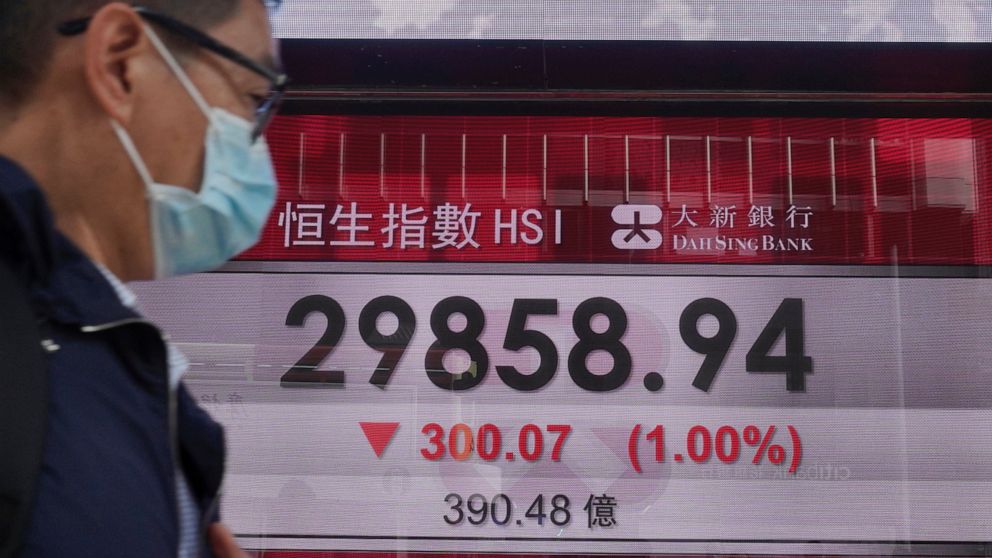Stocks give up an early lead and end lower on Wall Street
NEW YORK — Stocks ended lower on Wall Street Tuesday after spending most of the day in the red. The S&P 500 lost 0.1%, pulled down by losses in banks and industrial companies. Gains for some Big Tech companies like Amazon and Facebook helped keep the losses in check. Small-company stocks fell more than other parts of the market. Treasury yields rose. Investors weighed solid corporate earnings results against growing concerns about the pandemic. Many large companies are reporting this week from all parts of the economy, including American Express, Johnson & Johnson, Apple and General Electric.
THIS IS A BREAKING NEWS UPDATE. AP’s earlier story follows below.
Stocks were muted in afternoon trading on Wall Street Tuesday, as investors weighed solid corporate earnings results against concerns about the virus pandemic.
The S&P 500 was flat after drifting between small gains and losses. Most of the stocks in the index were down. Gains in technology and communications companies outweighed losses in energy, financial, utilities and other sectors. Blue chip companies like Johnson & Johnson and General Electric rose after reporting better-than-expected results.
The Dow Jones Industrial Average was up 29 points, or less than 0.1%, at 30,985 as of 2:45 p.m. Eastern. The tech-heavy Nasdaq composite was up 0.1%, within striking distance of another all-time high.
“The major theme, not only today but this week, is earnings season,” said Angelo Kourkafas, investment strategist at Edward Jones. “The early results are encouraging.”
Investors are in the midst of quarterly earnings reporting season for U.S. companies, and this is the busiest week so far. Dozens of large companies are reporting this week, from all parts of the economy, including American Express, J&J, Apple, GE and others.
More than 100 companies in the S&P 500 are scheduled to tell investors this week how they fared during the last three months of 2020. As a whole, analysts expect S&P 500 companies to say their fourth-quarter profit fell 5% from a year earlier. That’s a milder drop than the 9.4% they were forecasting earlier this month, according to FactSet.
General Electric climbed 4.9% after the industrial conglomerate reported a surge in cash flow. GE is attempting a turnaround after shedding unprofitable divisions and focusing more on big industrial products like jet engines and power equipment. Typically, when a company is in turnaround, investors care more about cash flow than quarterly profits because it shows the company is able to pay down debts.
Johnson & Johnson rose 2.5% after the company reported fourth-quarter results that cruised past Wall Street’s expectations. A big jump in prescription drug sales boosted the company’s revenue, but profits dove 57% due to higher research spending and one-time charges totaling $2.4 billion. The company also said it expects to share results from the late-stage study of its experimental COVID-19 vaccine, which requires only one dose, by early next week.
American Express fell 3.7% despite reporting stronger-than-expected earnings. The company’s card holders continue to postpone travel, entertainment and dining out due to the pandemic, which has cut into its bottom line.
Shares in GEO Group and CoreCivic, which operate prisons, slumped following news that the Biden administration will not be renewing federal government contracts with private prison operators. GEO Group slid 12.7%, while CoreCivic dropped 6.6%.
Meanwhile, traders are keeping a wary eye on rising coronavirus infections in various countries and a bumpy rollout of vaccinations in the U.S. The spread of variants that are thought to be more easily transmissible and might be less effectively targeted by existing vaccines is adding to alarm.
Vaccine maker Moderna said Monday that it will study whether a booster shot would be needed to protect against variants of the coronavirus, “out of an abundance of caution.”
“Nowadays the market mood is set by either the hopes that the COVID vaccine would mark the end of the biggest economic downturn of our lifetime, or the stimulus hopes to keep our heads above water. Yesterday, both hopes got smashed,” Ipek Ozkardeskaya, a senior analyst at Swissquote Bank, said in a commentary.
President Joe Biden has proposed a $1.9 trillion plan to send $1,400 to most Americans and deliver other support for the economy. But his party holds only the slimmest possible majority in the Senate, making approval uncertain. Several Republicans have already voiced opposition to parts of the plan.
The vaccine rollout and hopes for more economic stimulus have been guiding more optimism toward an economic recovery this year, but the picture remains unclear.
“Not all of those things are playing out in a clear way,” said Sylvia Jablonski, chief investment officer of Defiance ETFs. “We don’t know yet how much of the stimulus will come out and when.”
The yield on the 10-year Treasury edged higher to 1.04% from 1.02% late Monday.
In European stock markets, Germany’s DAX rose 1.7%, and France’s CAC 40 rose 0.9%. The FTSE 100 in London rose 0.2%.
———
AP Business Writer Elaine Kurtenbach contributed.
![]()


